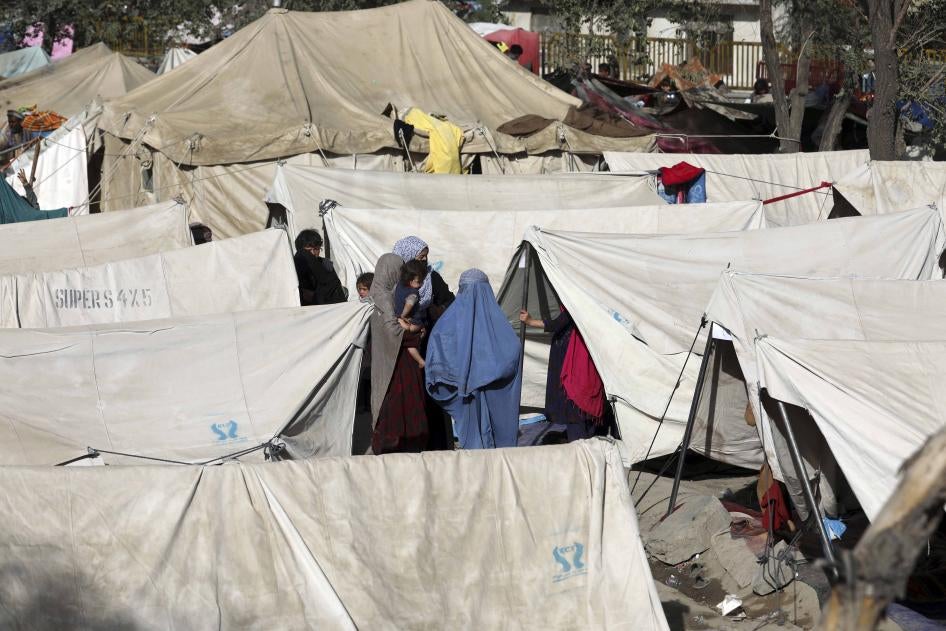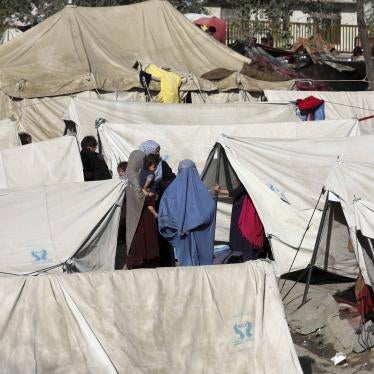Governments should adopt multi-dimensional policy responses to support Afghans seeking protection from Taliban persecution and rights abuses. Policies should address Afghans still inside the country who are seeking to leave, those in flight, and those outside Afghanistan who are afraid to return and need asylum or resettlement.
Afghans continue to face Taliban threats and intimidation. Those at greatest risk include members of minority communities, human rights defenders, women’s rights activists, high-profile women, journalists, media workers, judges, and others who held official administrative and security positions before the Taliban takeover.
Human Rights Watch has interviewed refugees who report having been harassed, beaten, and extorted by Taliban officials as they attempted to leave the country. Human Rights Watch has also documented abuses against others in many provinces associated with the former government, including members of the former security forces and members of the judiciary.
Governments and UN agencies should support Afghans seeking protection in the following ways:
- Expand pathways for Afghans seeking passage out of the country
Right to Leave: Taliban authorities should respect everyone’s basic human right to leave their country. Afghans and non-Afghans who want to leave Afghanistan currently have limited options. Since August, the Taliban have set up numerous checkpoints surrounding Kabul’s main international airport. Beginning in September, the Taliban have instituted a policy under which only Afghan citizens with valid legal documents can enter the airport, which has limited departures, and have ended evacuations.
Governments should use any diplomatic leverage they have with the Taliban to persuade them to adhere to their obligations under international human rights law and their own stated commitments, confirmed in Security Council resolution 2593, not to interfere with those seeking to leave the country.
Land Borders: Neighboring countries should keep their borders open to Afghans who are seeking asylum from persecution. Although 13,097 Afghans who crossed into Pakistan and approached the United Nations High Commissioner for Refugees (UNHCR) between August and early October, for asylum, the actual number of Afghans who have crossed is likely to be far higher since many who are crossing are undocumented. The Afghanistan/Pakistan border is formally closed to all except those with valid travel or work documents or traveling for medical reasons.
Although Iran set up three temporary tent camps in mid-August for Afghans fleeing the Taliban takeover, since entry is limited to people with valid passports and visas, Iran’s border crossing points have been generally closed to Afghan asylum seekers. Human Rights Watch has received reports of congestion on the Afghanistan side of the Iran border at Nimroz with estimates that about 2,000 Afghans per day are entering Iran irregularly, but a comparable number of Afghans are deported from Iran on a daily basis.
Airports: Governments should coordinate with Qatar, which provided technical support to reopen Kabul’s international airport so that regular departures by air could resume. Qatar has indicated it is still negotiating with the Taliban on airport operations.
Orderly Departure: Governments, and to the extent its mandate allows, UNHCR, should consider as part of their engagement with the new Taliban authorities in Afghanistan the possibility of establishing an orderly departure program, modeled on a similar in-country processing program that operated from Vietnam from 1979 to 1999 through which more than 500,000 Vietnamese were directly admitted as refugees to the United States. Any such program would need to be strictly understood as supplemental to other pathways and in no way a substitute for the right to leave Afghanistan by other means to seek asylum in other countries.
- Support Afghans in neighboring countries, at third country processing sites, and in onward destinations.
Pushbacks: UNHCR, governments, and other entities should monitor, document, and challenge pushbacks. Any collective expulsions, rejections at borders, forced returns, and denial of the right to seek asylum should be investigated, condemned, and remedied. All countries should observe their international legal obligations, and no country should deport or expel Afghans to Afghanistan, including on public health grounds.
All governments, neighboring countries, and onward destinations for Afghan asylum seekers and other migrants should fully respect international refugee and human rights law, as enshrined in the 1951 Refugee Convention and its 1967 Protocol, human rights law treaties, and customary international law. An essential element is the obligation of non-refoulement, a requirement not to send anyone back to a place where they would face the threat of persecution, torture, or other serious harm.
Reception Conditions: Afghans who do arrive and seek asylum in other countries, whether neighboring countries or onward destinations, should be given access to fair and efficient asylum and international protection procedures, including adequate reception conditions. Funding and resources should be mobilized for Afghans' reception and integration. Funding should include support for local authorities as well as local community-based groups hosting newly arrived Afghans. Vulnerability assessments should be carried out in accordance with international standards. Governments should provide dignified reception facilities, including for Afghans transiting through military bases or being held in third-country processing “lily pad” sites for medical and other screenings.
Access to Counsel: Some Afghans are being returned to third countries for secondary screening. Governments should ensure that Afghans have access to counsel and services while on “lily pad sites” and third country locations while they are held for security screening.
Psychosocial Support: Many Afghans are leaving their homes traumatized and vulnerable. Programming should consider the mental health needs of new arrivals, including the trauma of forced flight and the specific hardships they may have faced before and after leaving Afghanistan. Culturally and linguistically appropriate psychosocial support will be essential. When placing Afghans in communities, consider the capacity of the community to provide culturally competent support.
Unaccompanied minors should be reunited with family members. Some people, especially women and girls, may be traveling in family units that involve abuse. Screening of families should include a sensitive and culturally competent process to identify and support survivors of gender-based violence. Urgent case management for survivors of gender-based violence including emergency shelter should be available immediately to new arrivals, and they should all be made aware that these services are available.
Education: Education for newly displaced Afghan children has already been interrupted by the pandemic and by conflict, and now by flight. Neighboring countries, third-country processing sites, and any other country hosting Afghan refugee children should ensure that all girls and boys have access to quality and inclusive education without discrimination within three months of arrival, with the resources necessary to succeed such as language classes, and that all Afghans are integrated into national education systems. Donor countries should commit to fund education for all Afghan children, including children with disabilities, in countries neighboring Afghanistan and in Turkey, including previous arrivals, to help share the responsibility for humanitarian operations.
Health Care: Afghan refugees, migrants, and asylum seekers should be given access to health care, including Covid-19 tests and treatment, as well as vaccines, aligned with availability of vaccines to people with their individual risk profile in the host community. A full range of sexual and reproductive health services, provided with sensitivity and cultural competence, should be available to people immediately upon arrival. Dedicated support and assistance should be available and culturally, linguistically and age appropriate, including for people with disabilities, older people, and those with mental health conditions.
Rights Respecting Security Cooperation: Governments should ensure that cooperation agreements with neighboring countries on border control, ostensibly to combat human smuggling, do not prevent people from fleeing situations of human rights abuse.
Work Authorization: Afghans who are lawfully staying in receiving countries, including but not limited to those who arrived through refugee resettlement programs, should quickly and automatically be given authorization to work, including in cases in which they were allowed to enter the country on a humanitarian basis or if they have previously been denied asylum and work authorization.
- Expand refugee resettlement numbers for Afghans, with priority for those most vulnerable.
Resettlement Slots: Countries outside the region should make significantly more resettlement places available for Afghan refugees, providing alternatives for Afghans beyond countries of first arrival. Iran and Pakistan currently host more than 2 million registered refugees – and hundreds of thousands more who are unregistered – and are faced with the prospect of new arrivals.
- Australia has announced that it will allocate 3,000 slots for Afghans within its existing “humanitarian intake” program, but Prime Minister Scott Morrison has said it is a “floor, not a ceiling” and suggested that Australia could “achieve more.”
- The United States has not pledged a specific number of refugee resettlement places for Afghan refugees in fiscal year 2022 (which started October 1, 2021) but has set a 35,000 cap for the Near East/South Asia region – a region that includes other significant refugee groups – out of a global cap of 125,000. The US has a special Priority 2 designation for Afghans who worked for a US funded program, or a US based non-profit or media organization. The US should consider expanding the P-2 designation for Afghans to include other vulnerable groups and using the 10,000 unallocated reserve numbers, as needed, for Afghan refugees.
- UNHCR has requested that EU countries resettle at least 36,000 refugees in 2022, but this is a global request, not specific to Afghan refugees. Individual European countries should consider a targeted resettlement scheme for vulnerable Afghan refugees in addition to this commitment, to match the rapid increase in humanitarian needs.
- At the UN General Assembly, Canada announced that it was doubling the slots available to resettle Afghan nationals and would now seek to resettle 40,000 refugees creating two pathways. One would be through a program for government-sponsored refugees referred by UNHCR and the other through Canada’s Private Sponsorship of Refugees Program.
- The UK’s Afghan Citizen Resettlement Scheme will work with UNHCR to identify up to 20,000 Afghans for resettlement, including 5,000 in the coming year, prioritizing “those who have assisted the UK efforts in Afghanistan and stood up for values such as democracy, women’s rights, freedom of speech, and rule of law as well as vulnerable people, including women and girls at risk, and members of minority groups at risk (including ethnic and religious minorities and LGBT people).”
Link Priority for Resettlement to UNHCR criteria: Resettlement should remain based on a protection assessment and criteria prioritizing the most vulnerable refugees, while ensuring respect for family unity and non-discrimination obligations. In the context of Taliban rule, LGBTQI people and people with disabilities may face unique legal and physical protection risks in Afghanistan.
Benafsha Yaqoobi, a commissioner at the Afghanistan Independent Human Rights Commission (AIHRC), said she fears the Taliban will neglect and discriminate against people with disabilities due to the belief, held by many in the country, that disability is a punishment from God for the sins of parents. Kimahli Powell, director of Rainbow Railroad, the refugee advocacy group, said: “There is real fear that a resurgent Taliban government will target the LGBTQI community, and I think that fear is founded.”
Waive UNHCR Registration Requirements: UNHCR resettlement referrals are the preferred way to ensure that vulnerability is accorded priority in refugee admissions. But since some Afghans may currently be in, or end up in, a country where UNHCR has limited or no capacity to make refugee resettlement referrals, government should consider waiving requirements in their law to process and register refugees for resettlement with UNHCR. For example, Canada temporarily waived that requirement for Syrians and Iraqis, but its current resettlement plans for Afghans appear to require registration with UNHCR. Waiving this requirement in some circumstances could fast track urgently needed protection.
- Expand complementary pathways for Afghan immigration
Visas: Since the number of refugee resettlement places offered may not be sufficient to meet the need and since some Afghan refugees may not meet the UNHCR priority criteria for resettlement, governments should also expand complementary pathways, in addition to the refugee resettlement and asylum systems to facilitate the safe and orderly migration of Afghans. These pathways may include special programs developed for Afghans, private and community sponsorship, family reunification, visiting scholar, student, artist, and humanitarian and other professional work visas.
Processing and Documentation: Significantly scale up the capacity of embassies and consulates in countries neighboring Afghanistan to process family reunification applications and issue humanitarian visas; and apply procedural flexibility to visa applications including by conducting remote interviews. Governments that are processing Afghans’ visa and other applications should ease evidentiary requirements, as some documents may be impossible for people to acquire at this time, especially since some identity and educational documentation was destroyed to protect Afghans from Taliban reprisals.
Special Programs: Some countries have announced special programs to enable Afghans who worked for their military or development programs to seek asylum and move safely. These countries include the US through its Special Immigrant Visa Program, the UK through its Afghan Relocations and Assistance Policy and the Afghan Citizens Resettlement Scheme, Canada through its Special Immigration Program, and Germany through its “ OKV” program. Brazil has announced that it would issue new humanitarian visas allowing Afghans who have fled to neighboring countries to gain temporary residency or refugee status in Brazil. The Association of Federal Judges in Brazil has petitioned the government to allow Afghan women judges to relocate there on humanitarian grounds but is waiting for approval.
Private Sponsorship Programs: Governments should encourage, expand, and support private sponsorship programs by individuals, groups, faith-based or diaspora groups, municipalities and cities, and universities to welcome Afghans.
Family Reunification: When reviewing family reunification cases, governments should consider broadening the definition of the nuclear family; for example, to include adult petitioners’ parents and siblings, in line with UNCHR’s recent appeal for more liberal criteria for identifying qualifying family members. This would enable Afghans, regardless of their protection status, to sponsor their family members in Afghanistan.
Students, Artists, and Scholars: Several universities have opened slots or funded scholarships for Afghan students seeking to continue their higher education outside the country, including in the Czech Republic, the United States, Iran, and Kyrgyzstan. Some universities have funded places for Afghan scholars and academics too. Individual governments and others such as the European Commission, should financially support and encourage universities and others to set up and expand these kinds of programs.
Communities of artists in several countries, including in France and Australia, have mobilized funds and offered workshop places to Afghan artists. Governments should swiftly issue relevant visas for students, artists, and scholars so Afghans can apply for these programs, with special attention to ensuring that students already admitted to universities receive their visas in a timely fashion. Lack of access to consular services remains a problem for Afghans. The US government, for instance, is currently severely restricting access to student visas for Afghans, limiting options.
- Support Afghans already living abroad, and see that they are not sent back to danger
No Forced Returns: Deportations and forced returns of Afghans should be formally suspended, in line with the recent UNHCR advisory, including Afghans previously rejected for asylum. Deportations should also be immediately halted to countries where there is a risk of onward deportation and expulsion to Afghanistan, in violation of the obligation of non-refoulement.
Reviewing Past Asylum Denials: Immigration offices and courts should ensure that up-to-date country information is used in asylum processes, reflecting the latest security situation in Afghanistan in particular. Asylum cases of Afghan nationals who have previously been rejected should be eligible for another review due to the dramatically changed situation.
Temporary Protection and Path to Permanent Residency: Governments should ensure that Afghans who have lived on their territory for many years and established ties to those countries are provided a pathway to permanent residency. They should include those who are undocumented, or have entered without a visa, are staying on temporary visas, have overstayed their visas, or are rejected asylum seekers.
More than 4,000 Afghans in Australia are on temporary visas, many of whom may meet these criteria. In Canada, the government has announced “priority processing” and fee waivers for Afghans, including those whose temporary resident status has expired. The US government should designate Afghanistan for Temporary Protected Status, exempting Afghans already in the US from being deported and allowing them to work. The EU should consider triggering the Temporary Protection Directive for Afghans, allowing them to remain for up to three years with the right to work and study.









